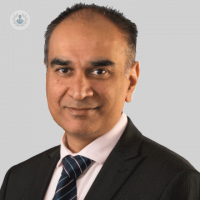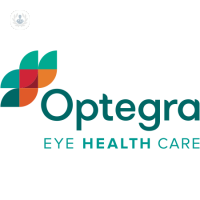What is keratoconus?
Keratoconus is an eye disorder in which the corneal tissue thins and deforms. The cornea is unable to support the internal eye pressure and it bulges out in a cone shape, hence the name, kerato, which means cornea, and conus, which means cone shaped in Latin.
It is a degenerative condition of the cornea that appears progressively in one or both eyes.

Disease prognosis
Although keratoconus is a degenerative disease, it can be corrected with glasses, with contact lenses, and different surgical procedures.
A patient with keratoconus should have regular corneal topographies to detect changes in the cornea.
What are the symptoms of keratoconus?
Keratoconus usually affects young people in the form of myopia and astigmatism as well as blurred vision. It may also cause eye irritation and increased photophobia (light sensitivity). A specialist will confirm the disease when and if they detect corneal thinning in the central or paracentral part of the cornea.
Tests for keratoconus
A corneal topography is done to check the curvature of the front and the back of the cornea and to detect areas of corneal thinning. New methods also measure the thickness of the very superficial layer of the cornea that is called the epithelium, as it starts to have different behaviour in keratoconus patients.
What causes it?
Keratoconus was thought to be a pure degenerative disease, however, new evidence indicates the disease to be part of an inflammatory condition, with intracorneal inflammatory cells causing focal thinning and protrusion of the cornea. This is evident as the disease is more common in patients with a history of allergic conditions such as atopic dermatitis and asthma. Bad habits associated with allergic conditions, like eye rubbing, are known risk factors. Genetics may also play a role, as the disease is more common in some genetic conditions such as Down's syndrome.
How can it be prevented?
To prevent keratoconus, it is recommended that you have your eyes checked at least once a year. There are also some actions that are best avoided, such as continuously rubbing your eyes. Early detection is crucial to be able to treat the symptoms and prevent corneal degeneration.
What is the treatment?
Prevention is the first thing to consider, especially if the patient feels that their glasses prescription is changing in a short period of time, as mild cases could be managed with glasses and contact lenses.
If the ophthalmologist discovers the keratoconus in an early stage, it could be controlled with collagen cross linking, which involved stiffening the cornea with ultraviolet light and vitamin B (Riboflavin).
In more advanced cases in which the patient cannot tolerate contact lenses, and if the vision is not corrected enough with glasses or contact lenses, a new procedure involving implanting rings inside the cornea (CAIRS surgery). The rings are made from a donor cornea, which makes them safer than the plastic rings that were previously used to correct the keratoconus corneas.
A new procedure to add tissue to severe cases of keratoconus to increase the corneal thickness and to flatten the cornea has been introduced in a few centres around the world.
Eventually a partial thickness corneal graft can be considered in severe cases to restore the clarity of the cornea.
What specialist should I see?
Keratoconus should be managed by an ophthalmologist.
11-13-2012 05-20-2015Keratoconus
Mr Radwan Almousa - Ophthalmology
Created on: 11-13-2012
Updated on: 05-20-2015
Edited by: Jay Staniland
What is keratoconus?
Keratoconus is an eye disorder in which the corneal tissue thins and deforms. The cornea is unable to support the internal eye pressure and it bulges out in a cone shape, hence the name, kerato, which means cornea, and conus, which means cone shaped in Latin.
It is a degenerative condition of the cornea that appears progressively in one or both eyes.

Disease prognosis
Although keratoconus is a degenerative disease, it can be corrected with glasses, with contact lenses, and different surgical procedures.
A patient with keratoconus should have regular corneal topographies to detect changes in the cornea.
What are the symptoms of keratoconus?
Keratoconus usually affects young people in the form of myopia and astigmatism as well as blurred vision. It may also cause eye irritation and increased photophobia (light sensitivity). A specialist will confirm the disease when and if they detect corneal thinning in the central or paracentral part of the cornea.
Tests for keratoconus
A corneal topography is done to check the curvature of the front and the back of the cornea and to detect areas of corneal thinning. New methods also measure the thickness of the very superficial layer of the cornea that is called the epithelium, as it starts to have different behaviour in keratoconus patients.
What causes it?
Keratoconus was thought to be a pure degenerative disease, however, new evidence indicates the disease to be part of an inflammatory condition, with intracorneal inflammatory cells causing focal thinning and protrusion of the cornea. This is evident as the disease is more common in patients with a history of allergic conditions such as atopic dermatitis and asthma. Bad habits associated with allergic conditions, like eye rubbing, are known risk factors. Genetics may also play a role, as the disease is more common in some genetic conditions such as Down's syndrome.
How can it be prevented?
To prevent keratoconus, it is recommended that you have your eyes checked at least once a year. There are also some actions that are best avoided, such as continuously rubbing your eyes. Early detection is crucial to be able to treat the symptoms and prevent corneal degeneration.
What is the treatment?
Prevention is the first thing to consider, especially if the patient feels that their glasses prescription is changing in a short period of time, as mild cases could be managed with glasses and contact lenses.
If the ophthalmologist discovers the keratoconus in an early stage, it could be controlled with collagen cross linking, which involved stiffening the cornea with ultraviolet light and vitamin B (Riboflavin).
In more advanced cases in which the patient cannot tolerate contact lenses, and if the vision is not corrected enough with glasses or contact lenses, a new procedure involving implanting rings inside the cornea (CAIRS surgery). The rings are made from a donor cornea, which makes them safer than the plastic rings that were previously used to correct the keratoconus corneas.
A new procedure to add tissue to severe cases of keratoconus to increase the corneal thickness and to flatten the cornea has been introduced in a few centres around the world.
Eventually a partial thickness corneal graft can be considered in severe cases to restore the clarity of the cornea.
What specialist should I see?
Keratoconus should be managed by an ophthalmologist.


I have keratoconus, will I lose my sight?
By Mr Arun Brahma
2024-12-20
Keratoconus primarily affects the cornea and is a condition that means the cornea has become cone-shaped. Naturally, as with any eye condition, patients worry that they'll lose their sight. Mr Arun Brahma explains what you should know about keratoconus and preserving your sight. See more


How much do you know about Keratoconus?
By Mr Vincenzo Maurino
2024-12-19
We're raising awareness for World Keratoconus Day! Expert Vincenzo Maurino explains the keratoconus signs to watch out for, and how KC can be treated. See more


How serious is keratoconus?
By Mr CT Pillai
2024-12-19
Keratoconus is a condition that affects the front part of the eye, causing it to bulge outwards in an irregular cone shape and results in blurry vision. Being diagnosed with an eye condition that you may not have heard of before can be pretty scary. We've asked one of our top ophthalmologists Dr CT Pillai to explain just how serious it is. See more


ICL: the advantages of implantable contact lenses
By Mr CT Pillai
2024-12-19
Vision. Perhaps the sense we rely on most to perceive the world is our sight. A variety of problems can affect our eyesight, and to combat these, technology and procedures to treat our eyes are continually advancing. Laser eye surgery is well-known and comes in a number of forms, but another option is that of implantable contact lenses (ICLs). Esteemed ophthalmologist Dr CT Pillai explains: See more
Experts in Keratoconus
-
Miss Valerie Saw
OphthalmologyExpert in:
- Cataracts
- Laser eye surgery
- Dry eye
- Keratoconus
- Corneal transplant
- Corneal cross-linking
-
Mr Amit Patel
OphthalmologyExpert in:
- Cataracts
- Refractive lens exchange
- Laser eye surgery
- Corneal transplant
- Keratoconus
- Dry eye
-
Mr Connan Tam
OptometryExpert in:
- Orthoptics
- Keratoconus
- Gas permeable contact lenses
- Dry eye
- Myopia
- Visual stress (Meares-Irlen syndrome)
-
Mr Mohamed Elalfy
OphthalmologyExpert in:
- Cataracts
- Laser eye surgery
- Dry eye
- Eye examination
- Keratoconus
- YAG laser capsulotomy
-
Mr Aris Konstantopoulos
OphthalmologyExpert in:
- Cataracts
- Laser eye surgery
- Keratoconus
- Corneal transplant
- Corneal cross-linking
- Lens replacement (intraocular lenses)
- See all

Laser Vision Eye Centre
Laser Vision Eye Centre
Winchester Road, Chandler's Ford, Eastleigh
No existe teléfono en el centro.
By using the telephone number provided by TOP DOCTORS, you automatically agree to let us use your phone number for statistical and commercial purposes. For further information, read our Privacy Policy
Top Doctors

Optegra Manchester Eye Hospital
Optegra Manchester Eye Hospital
Optegra Eye Hospital, Manchester One Didsbury Point, 2 The Avenue, Didsbury, Manchester
No existe teléfono en el centro.
By using the telephone number provided by TOP DOCTORS, you automatically agree to let us use your phone number for statistical and commercial purposes. For further information, read our Privacy Policy
Top Doctors

The Park Hospital - part of Circle Health Group
The Park Hospital - part of Circle Health Group
Sherwood Lodge Drive, Burntstump Country Park, Arnold, Nottinghamshire NG5 8RX
No existe teléfono en el centro.
By using the telephone number provided by TOP DOCTORS, you automatically agree to let us use your phone number for statistical and commercial purposes. For further information, read our Privacy Policy
Top Doctors
-
Laser Vision Eye Centre
Winchester Road, Chandler's Ford, Eastleigh , EastleighExpert in:
- Advanced surface ablation
- Laser eye surgery
- ICL lens implants
- Presbyopia (Presbyond)
- Keratoconus
- SMILE
-
Optegra Manchester Eye Hospital
Optegra Eye Hospital, Manchester One Didsbury Point, 2 The Avenue, Didsbury, Manchester , ManchesterExpert in:
- Cataracts
- Eyelid surgery
- Laser eye surgery
- ICL lens implants
- Corneal transplant
-
The Park Hospital - part of Circle Health Group
Sherwood Lodge Drive, Burntstump Country Park, Arnold, Nottinghamshire NG5 8RX, ArnoldExpert in:
- General Surgery
- Maxillofacial Surgery
- Oral surgery
- Plastic surgery, reconstructive and aesthetics
- Obstetrics and Gynaecology
- Podiatry
- See all
- Most viewed diseases, medical tests, and treatments
- Visual impairment
- Diabetic retinopathy
- Retina
- Visual stress (Meares-Irlen syndrome)
- Presbyopia
- Nystagmus
- Myopia
- Hyperopia (farsightedness)
- Eye examination
- Demodex








